Text

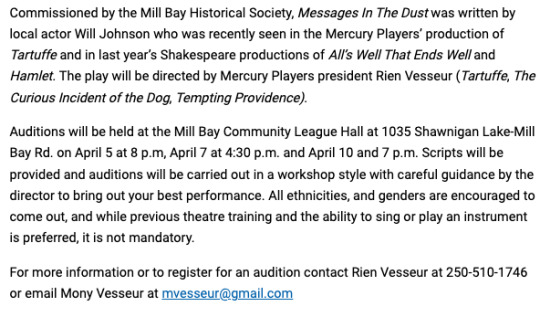
So,
Auditions for Messages in the Dust begin tomorrow.
Director Rien Vesseur and I will be looking for a quartet of performers who are quick on their feet and willing to throw themselves into our historical narratives with a vaudevillian energy. This is a fast-paced and lively show about the scoundrels, bastards and broken souls of Vancouver Island's history.
The show will be approximately an hour long without an intermission, and will be performed at venues such as the Forest Discovery Centre in Duncan and Shawnigan Museum Hall. It will run from mid-July to mid-August.
All four cast members will play multiple roles, and must be able to switch quickly between characters. The script also requires the performers to sing and dance, so experience in those areas is a plus.
Grateful to Chadd Cawson for publishing our notice in this week's Cowichan Valley Citizen, and helping us get this show off the ground!
The Literary Goon
0 notes
Text
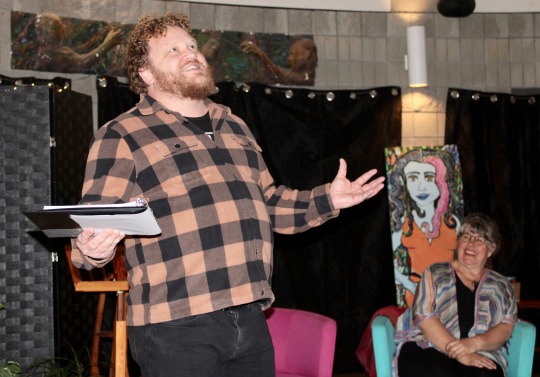

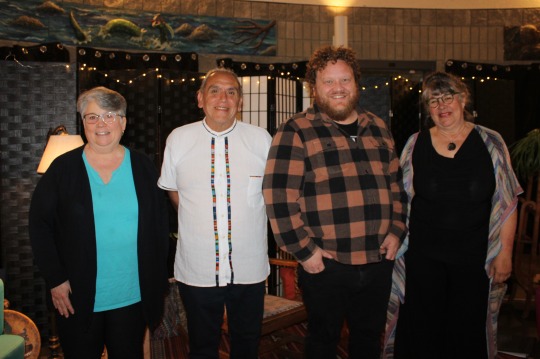

So,
Lady Celista takes flight!
Earlier this evening I did my first public reading of material from my upcoming sequel to The Ballad of Shuswap Joe. It's called The Long, Lonely Flight of Lady Celista and it's about my folklore legend's love interest, a British aristocrat named Celista who traversed the Atlantic in an aeroplane back in the 1930s.
Kristina and Aza accompanied me out to the Shawnigan Lake Community Centre, where I performed alongside three other local storytellers: Qwiyahwultuhw, Sylvia Swift and Laurie Giffin. I brought along my six-foot painting of Celista, which gave the audience an immediate visual to associate with my protagonist. Her appearance is based on my wife, who I pointed out in the front row.
Thanks to the Cowichan South Arts Guild and the Shawnigan Lake Museum for organizing the event, and inviting me to participate. It was a real privilege to share the stage with such talent, and having my squalling baby in the front row really added to the ambience.
The best moment of the night came when an audience member approached me afterwards with a friend to ask a question.
"So Lady Celista, did she really do all that?"
I wasn't sure what she was asking, so I asked her to clarify.
"Did she really fly her aeroplane across the Atlantic in the 1930s? Is that part true?"
I let her wonder for a moment before answering.
"No. It's all fiction."
She smiled as I explained that this was raft guide humour, that we tell tall tales that have just enough elements of truth to them that the average listener will believe them without question. We tell stories on the river about electric river eels, about historic lumberjack feats and about river channels that gobbled up entire families.
She nodded, said that made sense to her.
"I kind of wish it was true, though.”
The Literary Goon
0 notes
Text
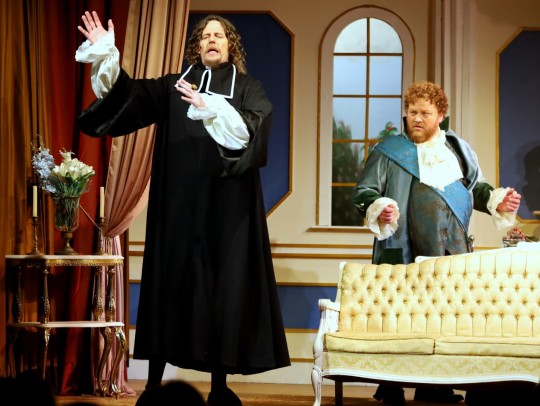

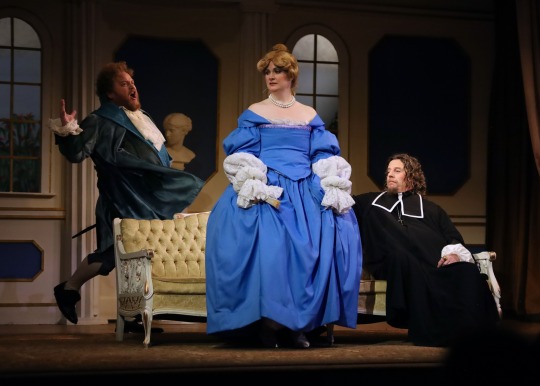
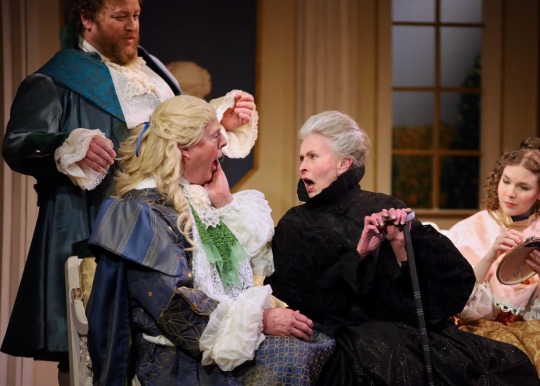
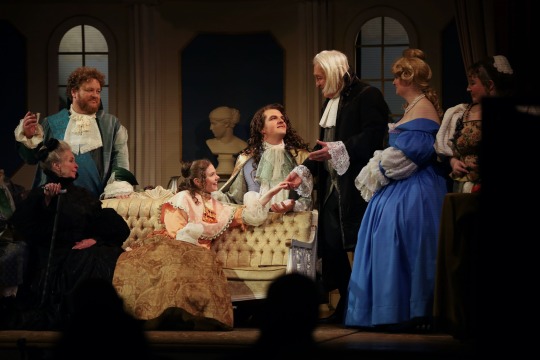
So,
I had so much fun doing Tartuffe.
This was my first Mercury Players production, and it was a great chance to hit the stage with some old friends and some new ones. It was also the first time I've been directed by my friend Rien Vesseur, who will also be taking the helm of my play Messages in the Dust this summer.
Thanks to Paige Amon for taking these awesome photos.
Did I tell you I'm on the board of directors now?
The Literary Goon
0 notes
Text

So,
Tartuffe is coming up.
Written in rhyming couplets by Moliere, this show is about a supposed holy man who ingratiates himself into a proud Parisian family in the 1600s. I play the tempestuous son, Damis, an incendiary brute convinced that Tartuffe is a religious fraud and intent on preserving his family's honour from this interloper.
This is my first show with the Mercury Players, but it features a number of familiar faces from the community theatre scene in Duncan. It's being directed by Rien Vesseur, who played my father in Hamlet, while my father Orgon is being played by Rob Foell — the king from All's Well That Ends Well. Once again I'm teamed up with Sylvia Swift, who is our intrepid stage manager.
It's also awesome that I get to share the stage with Chris Johnson, who plays my cane-wielding grandmother. My character ends up weathering a few of her acerbic tirades. And my stepmother is played by Sarah Kate Knight, who really holds her own against my self-righteous grandstanding.
Once again I'm enjoying the intellectual immersion of becoming another person. I'm playing with my physicality, allowing Damis to have the floating arms and snooty affectations of a high class Parisian. He's earnest in his love for his family, almost a comedic counterpart to when I played Laertes, but his braggadocio and aggressive nature win him no love.
There's a sort of frantic bravery to him.
Anyways, if you're interested in checking out this show, it's worth seeing for the costumes alone. All those frills and puffy cuffs and elaborate dresses... the costume department is working overtime for this production.
There will be eight performances at the Duncan United Church starting on Feb. 29 and running until March 10.
We'd love to see you there.
The Literary Goon
0 notes
Text

So,
Lady Celista has a new illustrator!
This week I met with my friend from the Shawnigan Players Jade Edgar to discuss illustrations for my Shuswap Joe sequel: The Long, Lonely Flight of Lady Celista.
The second book in the series, it chronicles the life of Lady Celista Spencer — a young member of the British nobility who becomes the first woman to traverse the Atlantic in an aeroplane. Set in the 1930s, it tells the story of how she met and fell in love with my folklore hero Shuswap Joe.
Jade is an incredibly talented artist who works with watercolour, chalk, paint and ink. Because my heroine has long flowing hair and a mythical energy, I was happy to go through Jade’s portfolio to see a bunch of scenes reminiscent of Ferngully or Avatar, with haunting feminine characters like mermaids and elves. I love her style.
Jade will be designing the cover of the book and contributing some illustrations throughout. I’m excited to see how she brings Lady Celista to life!
The Literary Goon
0 notes
Text

So,
I have a thing for mountains.
When I was living in Nelson, my first house had a back balcony that looked out at Elephant Mountain. It was the landscape before me every day while I drank my coffee in the morning, my slippers on the railing. It made me feel safe, like I was living under the benevolent gaze of a deity.
The crest of the mountain was indeed shaped like an elephant's head, with the opposite slopes creating his shoulders. I imagined that his gargantuan trunk was the slope that descended to the shores of Kootenay Lake, plunging into the water for a drink. To one side was a jutting rock called the Pulpit, which was shaped like a religious lectern.
As a reporter I had an insanely fulfilling function in the Nelson community, and I loved being the town gossip, the paparazzi. No culture had matched my temperament so exactly, from the nude beaches and burlesque to the theatre scene and the music festivals. I felt engaged in a way I'd never been my entire life. When I left in 2017, I felt like I would never rediscover the sense of belonging that I felt near that mythic elephant.
Then my life became a river. I spent two summers as a rafting guide, riding the whitewater currents from Tsawwassen to Victoria to the Shuswap and back. My life was fluid, flexible, lackadaisical but I didn't have a new mountain to call my own, a place where I truly felt like I could create a long-term home base. I was drifting.
When Kristina and I wound up in Duncan at the beginning of 2021, the first thing I noticed while touring the kitchen was that our front deck looks out at the misty, double-peaked Mount Prevost. It made me feel like I was in feudal Japan, every evening a vibrant new landscape worth painting. I stand out there with my easel and I can't believe I get to be here.
I've always thought the double peak on Mount Prevost is like God winking at me, letting me know the world in front of me is reflecting my newly married status. But there's also two mountains, because our house is situated on Mount Tzouhalem. It's like standing on the shoulder of a giant, getting ready to run into thunderous battle.
Just before Aza was born, I explored Mount Prevost in my car and scouted out a spot to do a maternity photo shoot. I then convinced my nearly nine month pregnant wife to make the ten-minute hike, and successfully got my favourite photo I've ever taken of her — it's now blown up and framed in our living room. This mountain is already intertwining itself into our lives, into our family history.
My mother-in-law said Mount Prevost reminds her of the Philippines, where she grew up. I've had other people compare it to Mount Olympus. Sometimes it hides in the fog, and other times I can see the war memorial at the summit if I squint. In the evenings it stands silhouetted black while the sunsets fluctuate from purple to orange to neon pink.
I will build my life on these mountains. It feels nice to finally be able to feel that way again, as I did with Elephant Mountain, like there's no other place I'd rather be.
The Literary Goon
0 notes
Text

So,
They say faith can move mountains, but explosives come in handy, too.
At Whistler Blackcomb, one of the largest ski resorts in North America, an elite team of avalanche management professionals have developed the science behind their profession for decades, operating as a pseudo-militaristic force that treks through some of the most challenging backcountry terrain on the planet in search of danger. From the thick of the Coast Mountain range, surrounded by jutting peaks of biblical proportions, they wage war on the weather with artillery guns, time bombs, and advanced ski-cutting techniques.
It’s a job many skiers are unaware of, or at least take for granted, as they enjoy the freedom and safety of a carefully groomed slope. Visitors at the resort are largely oblivious to the looming menace surrounding them at all times, or the elaborate calculations and manoeuvres the team must go through to safely open the lifts each day. From their lofty alpine headquarters, the team meticulously studies weather reports, snowfall calculations and historical patterns to choose which areas need intervention before something tragic occurs.
Read the full story here.
The Literary Goon
0 notes
Text

So,
I've finished writing about a quarter of my play.
At the moment I'm calling it "The Dead Know Nothing", and it's a compilation of historical stories about Vancouver Island. It's a commission for the Mill Bay Historical Society, and the aim is to get our first iteration of it onstage this summer.
The first historical topic I'm engaging with is the age of remittance men, an era that took place from the late 1850s to about 1915. Hundreds of thousands of British second sons — the members of the family who didn't inherit the estate — flooded into Canada in staggering numbers.
These dudes were hilarious. They wanted to recreate Britain here, and went about dressed as high nobility while they drank ferociously, wreaked havoc on society and even set up a little cricket club here in Duncan. They were known as family embarrassments, as scoundrels and crooks with no real skills to offer. They lived off a family allowance called a remittance, which is where their name came from.
This whole phenomena started after the Crimean War, as Britain was becoming disillusioned with the class system and aristocracy in general. All the commanding officers in the war had been chosen based on their social status, rather than merit, and because of that their colonial power suddenly looked like a weak embarrassment. Hundreds of thousands died.
I'm writing with the knowledge that this script could change radically in the next six months. We're planning to use music, and I'm going to write song lyrics, but we're not sure how that element will be pulled off. The cast could be as large as eight, as small as four — with everyone playing multiple parts throughout.
My instructions were to keep it light and lively, palatable for an all-ages audience. My tendency is to swerve a little dark, so I'm trying to find ways to inject humour into the proceedings. The remittance men, at least, have an outlandish and ridiculous quality that will be fun to channel into the narrative.
The other topics we'll explore in this show include the rum runners of Prohibition, a Nanaimo mine disaster in 1887, a country-wide chocolate boycott that started in Ladysmith, a teacher's suicide at a remote logging camp and even a whaling adventure. My task is to try to find a thematic through-line that someone pulls them all together.
The goal is to have a finished draft of this thing by the end of February, when I will collaborate with director Rien Vesseur to make this all a reality.
Then this show hits the road.
The Literary Goon
0 notes
Text

So,
Every morning seemed to bring Celista down to the Adams River, again and again.
She wandered the same route repeatedly, first hiking through the thick-packed forest from Shuswap Joe’s treehouse to the river’s edge, then following the grassy bank of its serpentine curve until it culminated in the thrashing maw of the canyon. She picked her way through river-slimed boulders and scrambled through the forest, an urgency to her vigil. Finally she would rest at a small ledge overhanging the main current.
This had nearly been her grave, and maybe that’s why she found herself transfixed by it. Far below the surface of this innocent-seeming river she’d met her unborn son, had an entire conversation with him, but who could she tell about such a thing? She knew it was silly but couldn’t help but wonder: what other messages from the future could the river bring her?
It wasn’t the first time Celista considered whether she really was crazy. She found it hard to be human. The fact that she had routine conversations with her imaginary sister — she knew this wasn’t normal. She had a pathological need to be alone, but how alone? Could she live like Shuswap Joe, up in the trees, a friendly hermit with a stash of hooch?
It was easier for men, she thought, because they could pursue the lives they wanted regardless of whether they married. Women, on the other hand, had one strategic move to make — choosing a husband — and that decision alone would dictate their entire life from that point forward. That’s why she had vehemently opposed marriage in the past, and that’s why falling in love with Shuswap Joe felt like such a betrayal of her deeply felt convictions.
For years Celista had vowed to forsake all entanglement with men. She felt their pressing attention any time she found herself in a room full of them, and it exhausted her being leered at and grabbed and desired. She’d resorted to violence on numerous occasions when men would bite at her neck or palm her waist, try to pull her into dark rooms or get her drunk enough to succumb to their clumsy advances.
She was disappointed in the human race, that one sex would be so predictably vile and entitled, while the other had to be subjected to relentless attempts to coerce them into the reproductive cycle by force. It was a trap, she figured. Our human sinister minds were tricking us into feeling love so that generation after generation we’ll keep enslaving ourselves to the one following. She wasn’t sure she wanted to ever learn how to change a diaper, how to prepare a bottle, how to wrangle a young mind and accompany it to parenthood.
But she was thinking about this all out of order.
First she had to classify her attraction to Shuswap Joe, itemizing each element of his character that appealed to her. Since she’d woken from her coma, he’d spent every day with her — nursing her wounds, bringing her food, telling her tall tales, and occasionally gawking at her like she was some species he’d never encountered before. He was casually strong, a superhuman climber, and seemed to have a relationship with both the river and the trees that was deeply symbiotic. His speech was simple and his sentences short, but this was the man who had once run the largest criminal enterprise in the Shuswap.
Joe’s menacing figure and grizzled beard were the tricks of his appearance, making him look like a man when he was much closer to a child. He didn’t have a traditional education, but had somehow learned to read, and did so daily while dangling thoughtfully in his hammock. His energy was measured and calm, and she hadn’t yet seen him lose his temper or act out of sorts. Being in his presence made her feel safe.
As she gazed at the river’s surface, watching the light bounce and flicker, she tried to conjure the image of the children she would have with Shuswap Joe. Her black hair would mix with his tri-colour beard, his giant frame would couple with her tiny one. She had caramel-coloured skin, his was the colour of teeth. Then there were his eyes, blue like the sky, while hers were earthy brown. If you put that all together, what would you get? As the waves rippled back and forth, the distinct shadows of three figures appeared. Two girls flanking one boy. The wind picked up all around her, sweeping her tears back from her face. What was this weird magic?
“Are those my children? Those three?” she yelled. “Is that what you’re showing me? Is that what you’re showing me?”
She was pacing back and forth, her heart thumping erratically. Something was going on that she didn’t understand. It was like a submerged version of herself was just beginning to breach the surface. She had primal yearnings that were hidden so well she didn’t even know they were there. Now her body was bringing her up to speed and it was telling her she wanted to get pregnant, and she wanted the father to be Shuswap Joe. She’d only been in his company for a week since the accident, but she ached for him in a way she’d never felt before. She kept picturing herself thrown over his shoulder like a hunting trophy, her bare legs trembling with excitement.
“You know, I used to pray to the river,” Joe said, emerging from the underbrush.
“I wasn’t praying. Just talking.”
Joe shrugged at that, then went to stand at the edge of the bank. He turned his face into the wind and smiled sadly. “I guess you’re a long way from home.”
She snorted, shook her head. “What home?”
“I heard you lived at the winery, over by the lake.”
“I’ve been there a while, sure. But that doesn’t mean I have to go back.”
“Don’t you have belongings there?”
“I brought everything I cared about in my backpack, and now that’s lost. Along with everything else.” For a moment she thought she might cry, but she refused to. “I guess you know what that’s like.”
Joe considered this, giving his beard a stroke. “The trouble with praying to a river is you can’t reason with it. You can’t change its direction, no matter how hard you try.”
“Are you saying I’m flowing in the wrong direction?” she asked. “Is that what you’re saying?”
Joe shook his head. “The river brought you here. I’m not one to question her ways. I may not pray to her, but I sure feel like I should when she delivers a gift like you.”
She blushed. “See, how do I know you and Nanor aren’t in cahoots? Like maybe you teamed up to bring me here? It’s pretty suspicious timing.”
“I’m just a lonely lumberjack grateful for some female company. That’s all, I promise.”
She smiled. “Is that all?”
Later that evening, as the setting sun plunged the Shuswap into a gloomy grey twilight, Joe and Celista sat with their feet dangling off the cliff face of the canyon. They were sharing a jug of Shuscotch, and Celista was starting to feel its warming effects. There were no fishermen with their dip nets on the canyon walls, no hunters passing through, no hikers or nature enthusiasts or tourists. They were wonderfully alone. She rested her face against his bicep, her hair spilling out on to his lap, while the sky began to come alive with colour.
“I brought you here to see the river eels dance,” Joe said, as the shadows deepened around them. “They have a slight green glow that you can’t see in the daytime, but at night you can watch them swishing around deep below the surface. It looks like they’re painting the river.”
“Nanor told me about those eels.”
Joe nodded. “They’re not native to this area. The eels were brought here by a scientist named Dr. Klondike many years ago. I met him when I was a child. He transported the eels here from some far off place in South America then introduced them to the Adams. He believed they had healing capabilities, that the electricity they produced could cure numerous maladies, and that he was doing everyone a favour. Now they proliferate, and their strange electricity is in all our water. That’s why people in the Shuswap have that spark of madness.”
“I think the eels stung me, when I fell. I never saw them, though. Only shadows.”
“They’re fast.”
“Have you been stung by a river eel, Joe?”
He laughed. “Oh yes, many times. Perhaps that explains the way I dream.”
“How do you dream?”
“In my dreams there are birds as big as automobiles. Sometimes the sky is purple. The people are twice, three times the size they would normally be. It’s a nightmare, really, but I experience every moment of it just as if I was awake. It’s like living two lives at once, and having to remind yourself constantly that only one of them is real.”
“That sounds scary.”
“There’s no enemy that’s ever scared me more than my own mind.”
There was a brokenness to Shuswap Joe that triggered the maternal side of Celista. She wanted to nurture him back to health, wanted to heal all those inner wounds that nobody else could see. During their conversations in the treehouse he’d shared that the loss of his distillery had been like infanticide for him, because he regarded that operation as his baby. He’d watched too many of his men go to their graves, and for nothing. In his nightmares their blood glowed green, like the river eels.
“I want to see one of these things,” Celista said. “Can you catch one for me?”
“A river eel? Give me a net and I’ll catch you ten in an hour. It’s easiest to get them at night.”
“So this electricity they have?”
“Yes?’
“Does it do anything else? If they bite you? That electricity, what does it do?”
“It makes some people hallucinate. And some people it just makes feel comfy and warm and contented with life. It sort of depends on the person.”
“Would it make you see something that’s not there? Is that what you mean by hallucinate?”
“Exactly, yes.”
“I saw someone when I was underwater. He came to me.”
Shuswap Joe turned to her. Behind him, the current had become alight with lime green shimmer as the river eels slithered downstream. This was exactly where she was supposed to be, and everything was happening as it should. Maybe the river eel juice was still spreading through her veins, animating her body, driving her towards her destined future. She put her hand on Shuswap Joe’s chest, and nudged open the top button.
“What did this person say?” asked Joe.
“He convinced me to fight harder when I was ready to give up and drown. He saved me. I’m telling you, he was as real to me in that moment as you are before me right now.”
“I believe you.”
“Do you think it was all make-believe? Or do you think something like that could happen?”
“Something like what?”
“That I could reach someone from another time, someone who doesn’t exist yet? Do you think he was real?”
“If he’s real to you, then he’s real to me. How about that?”
Celista considered his answer. “Thanks for saying that. I know I sound crazy.”
“I don’t think you sound crazy.”
Celista kissed him then, pulling herself into his lap. The sky had finally gone completely dark, making them black silhouettes on the canyon wall. The river provided their soundscape, in all of its gushing chaos. Joe was tentative at first, still on guard with her, but then he began kissing her passionately back, bear-hugging his arms around the small of her back.
“So who was this underwater person that you met?” he asked, between kisses.
She laughed. “You won’t believe me.”
“Give me a chance to try.”
“You really want to know who saw I saw down there?”
“Of course.”
Celista looked down at her lap, then looked Joe full in the face. She could see the shimmering beads of river eel light bobbing down the river. The black forest loomed all around them. She knew it was a risk, telling him the truth. She ran her fingers through his hair and sighed. She was on that canyon wall again, dangling over the rapids.
“It was our son.”
The Literary Goon
0 notes
Text
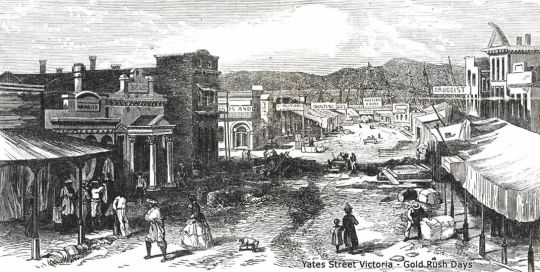
So,
I've been commissioned to write a historical play about Vancouver Island.
Last week I met with the Mill Bay Historical Society, along with Rien Vesseur of Mercury Players, to explore the possibility of remounting a traveling production they'd done 10 years ago. Featuring 4-5 real historical stories per show, it was performed in front of a giant map of Vancouver Island with a four-person cast of rapidly rotating characters.
I took a few days to come up with a proposal and a realistic timeline for getting this mounted for July 2024, and heard back today that their board has voted to go ahead with my plan. The goal will be to write a full draft of the script by the end of February, revise and refine in March, then start auditions in April.
Our show will be approximately an hour long, and will include stories that centre around illegality and criminality. We cover the devastating Nanaimo mine disaster that killed 150 men in 1887, and the crimes involving the rum runners that worked the coast of Vancouver Island during Prohibition, but the tone will be light, humous and educational — which means friendly for families.
When I told my Dad the news about getting this gig, he said "this is exactly what you've been talking about doing since you were a teenager." The project is similar to my Shuswap Joe stories, though less embellished, and it gives me an opportunity to deeply engage with our island's past and try to share something meaningful.
One of the decisions I have to make is how to link the stories together narratively. Past productions used the conceit of a child being told bedtime stories, but I'm thinking about using maybe two men in a prison cell or in a rowboat transporting alcohol or something like that. One of the big tasks will be collaboratively deciding on a title.
The ultimate ambition is to tour this show to multiple communities around Vancouver Island, potentially over the course of multiple years. Rien and I have both expressed tentative interest in appearing in the show as well, so I could even potentially end up acting in a play that I've written.
How cool is that?
The Literary Goon
0 notes
Text

Azalea and the Ghost Mists of Mount Tzouhalem, Part 2
by Will Johnson
Aza thought she could hear music in the mist.
At first it was just a faint tinkling, like somebody dancing their fingers over the keys of a piano, but each note became more distinct the further she ventured from her Dad. The landscape was mostly bare, with humps of fractured shale jutting up amidst the scraggly trees.
She was wearing shin-high snow boots with thick grey stockings under a navy blue dress. Her snow jacket had a fur-lined hood, and she’d pulled it up over her head to combat the freezing wind. She wanted desperately to be brave, but she couldn’t help the way her heart thumped against her sternum like some tiny person inside her was banging desperately for escape.
After a few minutes she came upon a cliff face. It loomed fifteen feet above her, disappearing into the whiteness. The rocks were tangled with thick vinery and a few twisted trees hung out at diagonal angles, their skinny branches drooping heavily. She was confused for a moment, because she thought she was going downhill, and she didn’t remember there being a cliff here.
She reached out and touched the cold stone, feeling it crumble under her palm. She gazed up, trying to see the top, moisture collecting in her upraised eyes. This obstacle made her feel afraid, like she’d taken a wrong turn somewhere, like this unyielding wall was standing between her and home. With her fingers outspread she pushed frustrated against it, blinking away tears.
Then, through the lilting melody of the breeze, she heard something new: a steady trickle of water. Aza swung her head from side to side, searching for the source of sound, and took a few steps back. Down the cliff wall to her left she spotted a tiny rippling pool of water in a fluffy bowl of moss, inky black with silvery glints. She approached it curiously, dragging her fingers through the vines as her boots crunched through the loose gravel.
As she got closer a waterfall came into view, flowing steady and uninterrupted. There were long dangling pink worms undulating in its current, roots from the foliage above, and the water collected at the base of a shower-sized opening in the slimy rock. She’d never seen a waterfall on Mount Tzouhalem before, not in the hundreds of times she’d been here with her family.
Now the music was louder. Not only that, she could clearly hear that it was piano — and it seemed to be coming from the other side of the waterfall. From the edge of the pool she leaned in to listen, trying to separate the rhythmic cadence of the water from the ethereal wash of the mysterious melody. There couldn’t be someone inside, could there? Was she starting to imagine things?
“Hello?” Aza called. “Is there somebody in there?”
When there was no reply, she worked her way around the perimeter of the pond and leaned behind the sheet of water. Droplets tickled her face as she strained forward.
“Is somebody playing music in there? Hello? Can you hear me?”
Still there was no answer.
For a moment Aza considered giving up, but her Dad had sent her on this mission and she didn’t think she could leave a mystery like this behind. Taking a bold step, she maneuvered behind the falling water and felt her boot find purchase on the slick rock beyond. The waterfall hammered down on the shoulder of her coat, soaking through it instantly, and she gasped with the shock of the cold. But then her second foot found firm ground and she found herself in a cavern hardly bigger than her body. She squinted into the startling darkness, wondering if she had made a big mistake.
Would anyone think to look for her behind a waterfall?
At this point, though, she was committed. Aza swiped at her shoulder a few times, took a deep breath, and marched forward with determination. The music was bouncing off the walls now, becoming more distinct. It reminded her of the classical music her piano teacher had played for her, of Mozart and Beethoven and Bach. If somebody felt comfortable enough to play this music, then this cave surely couldn’t contain monsters, could it? Or ghosts? She thought back to her conversation with her father, how she said there were people waiting to meet her. Would she find them here, underneath the earth?
People often told Aza that she acted older than her age, but at this moment she felt frightfully aware that she was only nine years old. Most adults were double, even triple her size. If she met someone in this dark corridor, what would she do? Aza was not a violent girl, but if somebody threatened her life she was ready to fight.
“Hello? I heard your music from outside. Can you hear me? Hello?”
Her voice sounded tiny and afraid echoing off the tunnel walls, and she began to make her careful descent. She splashed through puddles, bracing her hand against the damp wall to keep her oriented. The banging in her chest was picking up in tempo, and her breath came in quick bursts.
She suddenly wished her siblings Kris and Celista could be here with her, keeping her safe. They were always diligent about protecting their baby sister, whether on the playground at school or out in the chaos of the world. She’d become accustomed to being the baby of the family.
The tunnel curved to the right, and suddenly there was light flickering on the wet moss growing in the crevices of the wall opposite her. She picked up pace, moving towards the light, and as she rounded the corner the space filled with a fiery radiance. The piano was clear now, the notes lively, and she could make out the details of a bedroom-like space. Shadows were dancing on a wall decorated with framed photographs, and from the gloom she could feel a warm ambience. Somebody lived here in this subterranean warren, and they were happy to live here. But who?
“My name is Aza,” she called. “Can you hear me?”
Then the music stopped, abruptly. The shadows began to move, and for a moment she thought about fleeing back to the waterfall. But before she could move a woman appeared in the entranceway, silhouetted black. She was slightly stooped and clearly elderly, with her hair pulled into a tidy bun and her long flowing dress reaching down to the ground.
The woman stood there silent for a long moment, only a few arm’s lengths away from Aza. There was a strange power to her presence, like there was energy emanating from her body and filling the space between them.
“And here I thought you were going to be late,” the woman said, holding up a lantern. It illuminated her kind, wrinkled face. “But of course you’re right on time. Almost to the minute.”
Aza didn’t know what to say to that.
“Come, girl. Come inside and have a seat. You must be hungry, and I’m just brewing a pot of tea. You don’t need to be afraid, Azalea. Come, come. Come inside.”
“How do you know my name?” she asked.
The woman smiled mischievously. “I knew your name before you were born.”
“That doesn’t make sense.”
She laughed. “No, I don’t suppose it does. But I’m not going to eat you, and I’m certainly not going to chase you, so you may as well come in from the cold. You wouldn’t want to keep an old woman waiting, would you?”
The Literary Goon
1 note
·
View note
Text

Azalea and the Ghost Mists of Mount Tzouhalem, Part 1
by Will Johnson
Azalea Johnson had only been nine years old for three days when her Dad packed her into his minivan and drove her up the winding slope of Mount Tzouhalem, leaving the rest of their family at home.
It was early December, so jagged crusts of ice had accumulated in the rain puddles, the trees shimmered with frost, and the air had a sharp, sweet taste that moistened the back of her throat. It didn’t snow much on Vancouver Island, and it didn’t stay long when it did, but winter was still Aza’s favourite season of the year. Lazy flurries were drifting down from the white sky, bringing shimmering curtains of mist with them.
It was rare that Aza got uninterrupted one-on-one time with her Dad — her siblings Celista and Kristopher were omnipresent — but that morning he’d announced happily that he had a belated birthday surprise for her. He told her to dress warm, with hiking boots, gloves and some sort of warm hat. They were headed to the criss-crossing mountain bike trails five minutes higher up the mountain, a spiderweb of winding forest routes that included access to some of the best views in the area.
You could look one way to Saltspring Island or the other way at Mount Prevost.
From her low slouching vantage point in the passenger seat, the world beyond the windshield was mostly blank white. But she also had a clear view of the tendrils of mist interspersed amidst the towering trees that framed the mansions in their Duncan neighbourhood. She put her feet up on the glovebox, but Dad didn’t seem to notice. Or care.
He was too focused on the road.
“Sorry Aza, it’s foggier out there than I realized.”
“It looks like smoke.”
“A little bit, maybe. But I’ve always thought it looked more like ghosts.”
Aza gave him a sideways glance. “There’s no such thing as ghosts.”
Her father shrugged. “Maybe you’re right about that.”
Now she was questioning herself. She watched the mist coil and weave like spaghetti through a looming arbutus grove beyond the houses. It did kind of look like ghosts.
“Are they real, Dad?”
“They?”
“Ghosts.”
“What do you think?”
“I think they’re made up.”
“Now why would somebody make something like that up?”
She didn’t have an answer for that. Her father’s nonchalant attitude about ghosts was making her feel confused and anxious. Wasn’t he supposed to reassure her? If ghosts weren’t real, then she wouldn’t have to be afraid of them—right? But if they were real, then it would be totally appropriate to be afraid.
She watched the mist and bit her lip.
“These are the ghost mists of Mount Tzouhalem,” her Dad said, sipping from his oversized coffee mug. “And they’ve been here since the beginning of time.”
Her mouth gaped.
“They’re not as scary as they sound, baby. It’s just the spirits of the people who used to live here, all tangled up in our reality and lost in time.”
“Dead people?”
“Yeah, dead people. But in a way, they’re more alive than we are now.”
This was not the sort of thing Mom talked to her about. Sometimes Aza felt like she lived in multiple realities. There was the world of Catholicism, the world of stories, and the world of Dad. Each one had its own rules, its own explanations for how the universe operated. In Dad’s world, God wasn’t the only thing to believe in. He believed in all kinds of stuff that wasn’t in the Bible, or at least the parts of the Bible that were read to her at Sunday School.
Sometimes it was hard to know where to place her trust.
Their minivan had reached the narrow driveway to the hiking trails, an opening between two houses at the top of the mountain’s highest cul-de-sac. There were tire tracks in the slush, so it was clear they wouldn’t have the place to themselves, but this was still the most deliciously alone Aza ever felt. She loved the sound of raw nature, which was throughly muffled by human hubbub down at their house. Up on the mountain Aza liked to study moss, crane her head back to follow tree trunks into the sky, and splash through puddles until her jeans were soaked.
This was where she’d grown up, and Mount Tzouhalem had taught her far more than any school ever had.
Her Dad pulled the van around and parked next to the trailhead sign. Wearing two layers of plaid, one of them with a black hood that he was wearing draped over his head, he had a curly red beard with straggly white streaks. He placed his mug in the cupholder, grabbed his phone and swung open the door, grunting as he stood.
“Where are we going?” Aza asked, shutting her door and coming around the trunk.
“It’s just a little ways up here, at the plateau."
“Why are we going there?”
He laughed. “Are you trying to make me ruin the surprise? I wouldn’t want to live a life without surprise.”
“You’re so weird, Dad.”
“You might be right about that, baby. I am pretty weird.”
For the first few minutes they didn’t talk, trekking side by side up a steep incline. Dad was breathing hard, clouds of mist coming with every breath. She watched his face for some hint of where he was taking her and saw nothing but a glassy, emotionless determination. Beads of sweat were drooling slowly down his pinkened face, and he swiped periodically at his forehead with the back of his hand.
“Have I ever told you about your baptism?” Dad asked between struggling breaths.
“I’ve seen the picture,” Aza said, thinking of the image taped to his office wall. She was cradled in Dad’s arms while Mom looked on, the Filipino priest pouring water over her head from a white clamshell. She was wearing a frilly white dress with tiny white shoes, only a month old.
“That was New Year’s Eve, 2023. Nine years ago. Did anyone tell you that?”
She shook her head.
“We only found out later that the date — 12/31/23 — was ‘one, two three’ in sequence, twice. Two threes in a row, a special event that only comes along once every hundred years. That’s when we first got the sense, your Mom and I, that there was something going on that we didn’t quite understand. That we couldn’t control.”
“What do you mean?”
“You’re the third child of a third child, Aza. And your middle name comes from another third child. You were born on December 3, in the year 2023. Do you see what I’m saying? The threes are everywhere.”
“So three’s my magic number?”
“Your holy number. Like the trinity, Aza. This is divine math, baby, that will carry you through the rest of your life. But you have to be looking for the numbers. Always look for the numbers, everywhere.”
Her Dad pulled out his phone and squinted into the mist ahead. He whispered something under his breath, tucked it away into his plaid, and then picked up the pace slightly. Aza half-jogged to keep up as they stepped over a mossy trunk and made their way towards an opening in the treeline. She could see Lake Quamichan beyond.
“People will tell you that you’re crazy for thinking this way, but there’s more than one way to think. Do you understand that? Most people go their whole life without hearing the music of creation, without understanding the dancing ghosts that surround us at all times. The divine math of existence may seem scary, my girl, but I promise it will light your way as long as you follow the threes.”
“Follow the threes?”
“Promise me you’ll do that, okay?”
Aza reached out and took his hand. She didn’t always understand the things her Dad said, but she didn’t need to. She liked his language.
“I promise.”
They crested the hill looking out at Mount Prevost, and followed along a flat mossy field cut through with bike tracks. The mist was thick now, crowding in at all sides, and for a moment Aza thought she heard voices out in the white. She shuddered.
“This is it,” Dad said, clambering up a protruding rock. “This is your brother’s favourite spot, since he was two-years-old. We were playing Peter Pan one morning and he named this rock Strong Rock. He would chant ‘strong rock, strong rock, strong rock’.”
Her Dad seemed melancholy now, gazing off as he remembered the earlier life of the Johnson family. He chuckled to himself with one Blundstone planted against the pointed tip of the rock, the other braced flat against its middle.
He pulled out his phone again.
“This is what I’m talking about. Look what time it is,” he said, holding up his phone. “It’s 1:23.”
“So?”
“One, two three. See?”
Aza was confused by this whole expedition. Dad was acting scatter-brained, and he was making less sense than usual. She noticed that his forehead was shiny and he was fighting for breath, winded from their short jaunt. For a moment he seemed legitimately afraid.
“Dad, what are we doing here?”
He sighed, and closed his eyes for a long time. Then he sat down and ushered her over, his face now deadly serious. He held her by both arms.
“Aza, my girl. I can’t make the rest of this trip with you.”
“What do you mean?”
“I mean I’ve brought you this far, but I can’t go any further. There’s a whole story waiting for you out in that mist, but I’m not going to be a part of it.”
“Out in the mist?”
“The more I explain it, the less it will make sense. But I was told to bring you here on this day, at this time, and to wait for you at this spot.”
“By who?”
“I can’t tell you that in a way that would make sense right now, okay? I know it seems strange now, but you have to trust me. There are people out there who have been waiting to meet you for a long, long time. People who knew your name before you were even born.”
Dad sat down at the tip of Strong Rock. He gazed out into the billowing fog expectantly.
“And you’re going to wait here?"
“I will be sitting here on Strong Rock for as long as it takes for you to come back. If you don’t come back for 100 years, you’ll find my skeleton here. No matter how long it takes, baby.”
He touched her face, and gave her a pained smile.
“What’s out there? Why is this happening?”
He kissed her gently on the forehead.
“Remember to look for the threes.”
The Literary Goon
0 notes
Text

So,
The best teachers are the ones who give you permission.
When it comes to conjuring up ideas and bringing them to life on the page, the biggest hurdle most writers experience is believing in themselves — is it worth it? Will anyone ever read it? Am I really talented enough to transform the images in my head into a tangible reality? And the fact is, the only way to truly learn the answers is to give yourself the opportunity to try.
Since putting myself out there as a mentor earlier this year I've had a bunch of aspiring writers trust me with their work, including everything from literary novels-in-progress and coming-of-age memoirs to short horror stories destined to live on DeviantArt and academic papers for school.
If you feel like you need permission, and encouragement, to finish whatever writing project you're working on, then I hope you consider a Literary Goon mentorship. Sometimes they're short-term, with just one small project to complete, while others tend to stretch out over years.
Either way, I'm ready to invest in your vision and coach you all the way to the finish line. Contact me here on Facebook, or email [email protected] to get started!
My services:
Short-term mentorship: $150 for three rounds of feedback on a short work up to 10,000 words
Manuscript evaluation: $500 for a read-through and single round of feedback on a manuscript up to 100,000 words
Manuscript mentorship: $1000 for three rounds of read-through and feedback on a manuscript up to 100,000 words
The Literary Goon
1 note
·
View note
Text

So,
I'm going to be living and breathing Hamlet for the next three weeks, from our first show on Thursday evening until our final show in early November.
The most recent issue of the Cowichan Valley Citizen features a story about our production, written by Chadd Cawson. It includes a fascinating interview with our director Laura Faulkner and information about how she's decided to donate partial proceeds to the Men's Therapy Centre.
"This summer marked five years since the suicide of a dear friend, and I’ve seen others I know and love descend into very dark places when they’re in unresolved pain," she said.
"A shocking number of people I know have lost loved ones, especially men, to mental-health related tragedies, and there are so few socially acceptable ways for men to process their emotions in healthy ways."
As someone who has grappled with mental health issues myself, that means a lot to me.
It's been a real journey to work with Laura as she navigates the process of conjuring up a text that's so familiar to so many people, then trying to discover new angles and unique elements to make it her own. I really appreciate her dedication to depicting the psychological reality of the characters, and the fun flourishes she's added — such as a troupe of hilarious mimes who appear throughout to embody the words being spoken onstage.
Besides playing Laertes in this show — a choice role that includes vowing colourful revenge, experiencing deep grief and then sword-fighting to the death — I also took on some new publicity and promo responsibilities for the Shawnigan Players this time around. It's been an awesome experience to peek behind the scenes and work with the production crew, including our awesome stage manager Megan Bourns.
When you come to see Hamlet, the program will include headshots, promo photos and behind the scenes shots that I took in the last month. You'll also find a link to a YouTube video that I filmed and edited that features the cast taking turns delivering the immortal lines of the "To be or not to be" soliloquy.
Today I swung by the Duncan Showroom, where owner Longevity John Faulkner was transforming his quirky little venue along with our team to prepare for the 10 performances ahead of us. It's an intimate space with a multi-layered stage that will beautifully transport audiences to the misty, haunted setting of Elsinore Castle in Denmark.
Like All's Well That Ends Well this summer, being involved in this show has been one of the most rewarding, immersive and fulfilling experiences of my life. This year I've rediscovered my passion for acting, fallen in love with Shakespeare's work in a way I didn't previously think possible, and found a new hobby that I feel will sustain me as the Johnson family continues to acclimatize to life in Duncan.
I hope you can come see our show!
The Literary Goon
2 notes
·
View notes
Text
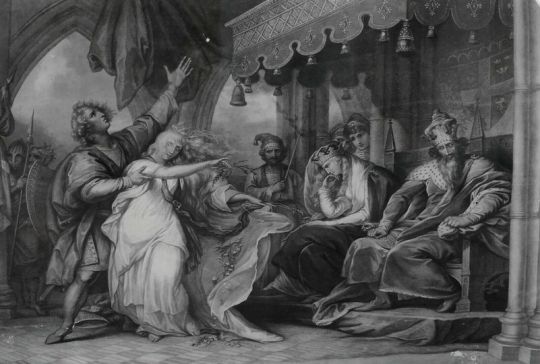
So,
I'm going to have to cry onstage.
Since we've wrapped our performances of All's Well That Ends Well, I've been hard at work preparing for my role as Laertes in the upcoming Shawnigan Players production of Hamlet going up at the Duncan Showroom in late October. And now that I've given my best shot at comedic acting, this play will give me a chance to try tragedy.
I thought I remembered Hamlet pretty well from high school English, but immersing yourself in a particular character's headspace and spending months marinating in the text gives you a much more profound sense of the story. Laertes only has six appearances in our show, but has some of the most impactful lines and devastating scenes. He is briefly introduced in the beginning, then disappears for the majority of the play before reappearing in a boiling rage, intent on revenge.
Today we went over the blocking for one of the final scenes of the show, dissecting the text with my director Laura Faulkner and pondering the emotional trajectory Laertes is going through. Generally he's a principled and well-liked dude, respectful of tradition and hierarchy, but he's been driven to the edge of madness by his grief and fury — much like the titular character.
One thing that was identified for me while I was studying acting at Studio 58 is that anger is situated squarely within my comfort zone, something that was further confirmed while I was playing Bertram this summer. I should have no problem with Laertes' vengeful boasts — "I dare damnation", he proclaims at one point — but a much bigger challenge is portraying realistic sadness on stage.
It's a much more vulnerable spot to be.
In this scene, while plotting murder with King Claudius (played by Brian Dennison), I'm faced with the devastating — SPOILER ALERT — news that my sister Ophelia (played by Cecilia Dennison) has drowned. The news hits Laertes like a gut-punch, further compounding his already overwhelming grief, and he begins to cry against his will.
"Too much of water hast thou, poor Ophelia, and therefore I forbid my tears," he declares futilely.
This is what I love so much about this character. Despite all his swaggering braggadocio and blasphemous threats, he is animated by a deep and abiding dedication to his family. The final four scenes of the show, in which he engages in a graveside grapple with Hamlet, participates in an assassination scheme and generally proves himself to be someone not fo be fucked with, are all driven by his overwhelming love for his deceased family members. Deep down he's a big softie.
When I was studying my copy of the Collected Works of Shakespeare, which I bought for Kristina earlier this year, I learned that Laertes is far more significant to the plot than I realized. The moment that his father Polonius (played by Rien Vesseur) is killed, he becomes the mirror image of Hamlet — a son seeking vengeance for his patriarch's murder. While Hamlet spends nearly the whole play procrastinating and second-guessing himself, Laertes flies at his revenge with a single-minded madness that serves as an example to our moody Danish prince. If it weren't for Laertes, perhaps Hamlet would've never gotten around to actually going after his murderous uncle.
In preparation for this show, I've been watching the movie adaptations of the play — I've seen most of the Kenneth Branagh version, and fast-forwarded to Laertes' scenes in the contemporary Ethan Hawke one. The things that stand out the most to me all revolve around his relationship to his sister (played by Kate Winslet and Julia Stiles) as she's the one who truly breaks his heart.
You get the sense, studying the text, that his quest to avenge Polonius stems more from pride and filial duty. It's something that he believes is expected of him. With Ophelia, it's different. When he leaps into her grave and ululates wildly about her perfection, the audience sees that he is wholly sincere in his devotion to her, that she's taken a piece of his soul with her. This guy is broken in a way that can't be fixed.
"A minist'ring angel shall my sister be when thou liest howling," he snaps at the presiding priest.
Shakespeare was writing from experience here, because he lost his only son Hamnet in 1596, which was approximately four years before Hamlet was published. I wondered at first how the Bard could write something so hauntingly dark and grief-filled, but when I learned of his own personal family tragedy suddenly everything made sense.
Was this play how he processed his own raging emotions?
Which brings me to my own sister Kathryn, who passed away by equally tragic circumstances to Ophelia, three years ago. Right away when I started learning my lines, I knew that this emotional reality would be dredged up by this acting experience. I may not have sought revenge when she died, but I certainly wanted to — I threw a Christmas tree across a lobby, kicked down a hotel room door and ended up in the psych ward three times in a month. I remember clearly being curled up in the fetal position in a snowy parking lot, chainsmoking cigarettes and convinced that I would never be able to experience happiness again.
I wanted to die.
So when Laura smirked at me today and said "you're going to have to cry" for this scene, I knew that Kathryn would be the emotional nuke that I could deploy to accomplish this somewhat terrifying feat. Most actors know how to cheat-cry, how to make their voice break or how to produce real-sounding sobs. But what I'm going to aim for is full out method-style tears, with real liquid running down my cheeks, each tear a tribute to the perfect sister I lost way too fucking soon.
If Laertes can do it, so can I.
The Literary Goon
1 note
·
View note

